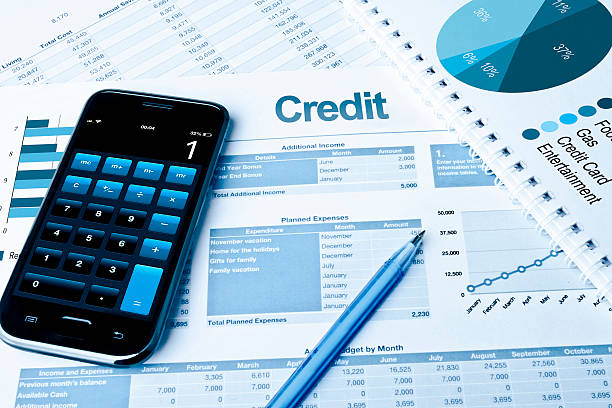Credit Analyst Role
Analyze credit data and financial information of companies or individuals who are applying for loans
The primary duties of a credit analyst include analyzing credit data and financial information of companies or individuals who are applying for loans. The analyst will then use the information collected to determine any potential risk of lending the fund to the individual or borrowing institution.

Those employed as credit analysts are expected to have the skills and ability to handle very high levels of responsibility in their jobs. For instance, some lending proposals may be for amounts as great as $50,000,000.
Employers of a credit analyst might include commercial, investment, and foreign banks, private equity firms, investment/ asset management companies, specialist credit rating agencies, and insurance companies.
Overview of the typical tasks performed by a CA
- Evaluating clients' credit data and financial reports to gauge the risk involved in lending money to them.
- Reading financial briefings
- Conferring with clients to verify their financial/ credit transactions and resolve their complaints
- Undertaking risk analysis through the development of statistical models
- Analyzing and interpreting complex financial information
- Helping at enhancing the quality of credit applications
- Using credit-scoring systems for small credit amounts- for instance, unsecured personal loans.
- Making recommendations about procedural/ policy changes
- Keeping knowledge of crucial issues up-to-date - this can include legal, market risk, and compliance issues.
- Working alongside supply chain, sales, and marketing departments in managing financial orders to help them control credit exposure, make timely payments, and reduce the risk of customer disputes

To work as a credit analyst in a major banking and financial institution, an individual needs to have the following skills and traits :
- Strong time management skills
- Excellent eye for detail
- Ability to work effectively under pressure
- Problem-solving
- IT skills
- Good team working skills
- Confidence and adaptability
How to become a certified credit analyst
Becoming a certified credit analyst can be long and challenging, but the rewards can ultimately be attractive for an individual. The most common path usually has a relevant bachelor's degree in accounting and finance coupled with some entry-level work experience.

Step 1
Earn an associate degree or bachelor's degree- Even if some employers prefer candidates holding a bachelor's degree, attending a 2-year associate degree program in accounting and finance followed by work experience might be a viable option for incoming CA.
For those pursuing a four-year bachelor's degree program, majoring in Accounting or Finance is advisable.
Step 2
Gain work experience in an entry-level position- After earning a college degree, prospective certified analysts have the required education to apply for and complete a few years of work experience in junior or mid-level roles.
This period will allow professionals to gain onsite job training and equip them with the skills to complete the work of credit analysts. They can also use this opportunity to enhance their assessment and accounting skills to better prepare them for career advancement opportunities.
Step 3
Compare certification options to your career goals- It is essential to determine which certification reflects your career goals as a certified credit analyst, given the wide range of professional certifications available by accredited institutions.
Step 4
Select a certification that matches your qualifications- When analyzing the various credit analyst certifications, it is essential to determine the required qualification criteria for each and whether your current education and professional experience make you eligible to apply.

Step 5
Complete a certification program- Certification programs for credit analysts vary in length and can be completed via various platforms such as in-person, online, or hybrid learning options. It includes a few months of courses, studying materials, and passing a certification exam.
Step 6
Add the newly acquired credentials to your resume- Once you achieve the title of a certified credit analyst, you can add your recently obtained title and the certification you received under the education section of your resume to boost your job marketability.
Available Credit Analyst Certifications

Below are lists of available Credit analyst certifications.
1. Certified Credit and Risk Analyst (CCRA)
Provided by the National Association of Credit Management (NACM), the Certified Credit and Risk Analyst certification helps finance professionals enhance their ability to assess financial data and improve their decision-making skills.
It consists of three modules: financial accounting, financial statement analysis, and risk assessment. Students are expected to complete each course with an in-person class and an in-person exam.
Prerequisites:
Completion of a college degree program in an area like finance and accounting
2. Credit Risk Certification (CRC)
The risk management Association provides the CRC certification to credit analyst professionals. Prospective candidates can prepare for the CRC examination by studying the RMA's study materials and reviewing topics related to commercial borrowing, risk analysis, and underwriting.
Prerequisites:
The applicant is expected to have completed a college degree program in addition to three to five years of professional experience in an area such as credit analysis or banking.

Interview Questions
An interview is essential when deciding whether an individual is fit to work as a Credit Analyst. In addition, the individual must possess strong oral communication skills and specialized knowledge about the industry, which can be best valued during a face-to-face interview.
Below is a list of interview questions that can potentially come out during the interview process for a Credit Analyst:
General Questions
Those are made in such a way that the hiring manager gets a good understanding of the applicant's background, interests, and personality:

- Tell me about your educational background
- What was your favorite subject in school?
- What books are you reading right now?
- Why are you keen to work as a credit analyst?
- What makes you interested in working for our company?
- What do you expect to achieve in your role as a credit analyst?
- Tell me more about your greatest strength and weakness
- How do you imagine a typical day at work?
- How would you feel about rejecting a loan application from someone you like?
- What are your expectations of a typical day at work?
- Could you tell me about our company's goals and aspirations?
- Walk me through your resume
- Where do you see yourself in five years?
In-depth questions
These interview questions are designed to give the interviewer a better idea of an interviewee's problem-solving abilities and experience for the position.
- Tell me a technique you used before to determine the profitability of a loan.
- Explain working capital
- Share with me a time that you met with a complaint or challenging situation that you managed to solve effectively.
- Run me through data gathering and analysis and the steps you take to gather relevant data.
- Run me through a cash flow statement
- Explain to me the parameters you would consider when evaluating whether you could lend $20 million to a company

Interview questions with model answers
1. Tell me how proficient you are working with financial software and technology?
Prospective analysts must use special financial software to develop statistical models and generate financial ratios. Apart from listing specific financial software you are familiar with, your answer must include how you leverage technology to perform market research.
Typical answer: "I'm highly comfortable using Microsoft Excel and Minitab(statistical software). I also use computers to keep track of the latest industry trends and undertake market research."
2. Share with me how proficient you are at performing financial analysis
To succeed as a CA, you must proficiently perform financial analysis. The ability to communicate to the recruiters that you have good command at understanding financial documents and other aspects of a company's or individual's finances can make you stand out.
Typical answer: "I have a lot of experience with different methods and tools for performing in-depth financial analyses for companies. When going through a customer's application, I look deeply at their finances, evaluating their cash flow, financial statement, and market shares."
"This procedure allows me to determine their credit situation quickly and accurately."

3. How do you determine whether or not you should lend money to a company?
A credit analyst's job is to examine a customer's or company's financial state. Therefore, they must have a proven technique for evaluating records and meeting with customers to address issues.
By bringing out this question, the interviewer can learn about the process that the analyst used in the past and whether it proved to be effective. A good answer should provide clear and straightforward steps for evaluating whether you should lend money to a company or not.
Typical answer: "I'll start by reviewing their financial reports from the past years and perform a thorough analysis, such as ratio calculations of the company's finances. Next, I will identify the amount of cash flow the company has and what assets they own that could be used as collateral.
If all the numbers obtained are within the set parameters set by the institution, they will likely be eligible.
FAQs

- Accounting skills
- Knowledge of the industry
- Communication skills
- Problem-solving
- Attention to detail
- Knowledge in risk analysis
The primary tasks involve evaluating the client’s credit data and financial statements to determine the risk in lending money.
Credit analysts are compensated with a solid salary, good benefits, and the opportunity for advancement. Some credit analysts go on to other exciting paths, such as loan managers, investment bankers, and portfolio managers.
- Character
- Capacity
- Capital
- Collateral
- Conditions
The overall job outlook for Credit analysts' careers has been positive since 2004, whereby job vacancies have increased by 7.42%.
On average, the salary of a credit analyst in the US stands at $55,000 annually. This estimate varies on the industry, company, and state of employment. Moreover, an individual with more work experience can expect to earn higher than the average salary.
Researched and Authored by Alvin Dookhony | LinkedIn
Free Resources
To continue learning and advancing your career, check out these additional helpful WSO resources:









or Want to Sign up with your social account?